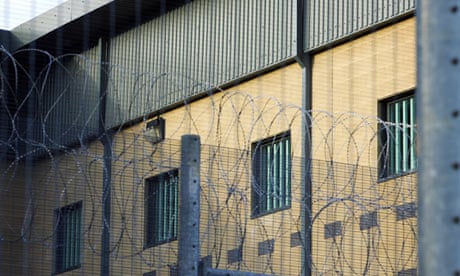An increasing number of asylum seekers are being released from detention after almost starving themselves to death, the Guardian has learned.
On Monday alone, four men were freed from Harmondsworth immigration removal centre after refusing food for weeks, according to sources both inside the centre and at the Home Office. As many as 17 inmates were on hunger strike at the centre last month, the Harmondsworth source said.
Security staff say they are placed in an impossible situation as more detainees refuse food as a means of obtaining their release. "We do not want detainees to die, but releasing them may encourage other detainees to go on hunger strike. It is a lose-lose situation," said the Harmondsworth source, who asked not to be named for fear of losing their job.
The four asylum seekers released on Monday had been assessed as medically unfit for detention weeks earlier, the centre source said, but the Home Office refused to release them until this week when one of them was at "death's door". The centre's watchdogs said they were "amazed that a doctor's judgment is overruled".
One of the four – a 31-year-old Algerian who asked to be known as KS – was extremely weak after refusing food for 56 days and losing 30kg in weight. The men, three Nigerians and an Algerian national, had been held in the healthcare centre at Harmondsworth on "constant watch", meaning a member of staff had been by their bedside constantly. Lawyers acting for two of the men had threatened to seek a judicial review of their continued detention.
Harmondsworth, near Heathrow airport in west London, is the biggest detention centre in the immigration system, privately operated by GEO. Seven men have died there since it opened in 2001. The purpose-built centre accommodates 615 asylum seekers, pending resolution of their cases and their removal from the UK.
The UK Border Agency (UKBA) source at Harmondsworth said a number of the 17 inmates who were on hunger strike last month have been sent to other centres to ease the burden at Harmondsworth.
The source said all those who refuse food are asked to sign a declaration that they do not consent to the administration of nutrition or hydration in any form and will not receive medical treatment, including resuscitation if their condition deteriorates.
According to the source, some detainees suffer mental health problems and are not capable of giving consent.
KS was allowed to return to his home in London after a 56-day hunger strike.
He told the Guardian he would face a military court if he were returned to his native Algeria because he deserted the army after being ordered to abuse civilians. He would rather die than be returned, he said in a phone interview.
"Life is precious, but knowing what I face if I am forced to return to Algeria, death would be preferable." He said he would continue to fight removal from the UK and was submitting a fresh claim to the Home Office.
It was his second time in detention. He was in custody for a year in 2011/12, released and arrested again in April this year despite, he says, fulfilling all his reporting conditions.
In its 2012 report on Harmondsworth, the Independent Monitoring Board (IMB) criticised the Home Office for not releasing men who had been medically assessed as unfit for detention.
The report said 125 detainees were reported to UKBA as unfit for detention in 2012, "of which only 11 resulted in the detainee being released. We are amazed that a doctor's judgment is overruled in nine cases out of 10."
Theresa Schleicher is the casework manager for Medical Justice, a charity which challenges inadequate healthcare provision for detained immigrants. She said independent doctors sent by the charity to visit hunger strikers were concerned to find them still in custody after being found unfit to be detained by doctors at the centres. A number were not treated according to Department of Health and Home Office guidelines, she added.
Schleicher said doctors often find hunger strikers near to organ failure and death and are forced to write medico-legal reports for lawyers to get a high court injunction ordering their release.
"We dread to think what happens to hunger-striking detainees who we are not in contact with, or who do not have a lawyer," she said.
The Labour MP John McDonnell, whose Hayes and Harlington constituency includes Harmondsworth, expressed concern at the developments.
He said: "I am dealing with case after case of desperate people detained at Harmondsworth for no justifiable reason. There needs to be an independent review of the policy of large-scale detention that has developed in this country."
A Home Office spokesperson refused to comment on individual cases but said in a statement: "We take the welfare of our detainees seriously, and their health is monitored closely by trained healthcare professionals.
"If there are any concerns about an individual they are referred to hospital. Decisions on whether continued detention is appropriate are based on the circumstances of the individual case."



